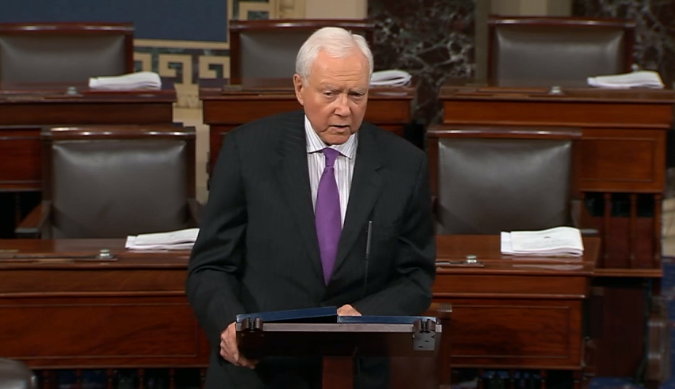Press Contact:
202-224-4515, Katie Niederee and Julia Lawless
Hatch to POTUS: Time to Stop Using Tariffs and Start Negotiating
Utah Senator Says, “If the administration continues forward with its misguided and reckless reliance on tariffs, I will work to advance trade legislation to curtail presidential trade authority.”
WASHINGTON – Senate Finance Committee Chairman Orrin Hatch (R-Utah) today urged the administration to rethink its global trade strategy during a speech on the Senate floor, emphasizing that it could undermine the success of tax reform.
“The administration has implemented or threatened global tariffs on approximately $500 billion of goods. Pure and simple, tariffs are a tax on American businesses and consumers,” Hatch said during his speech. “These actions put American families and businesses at risk, and threaten to undermine the success of tax reform. Furthermore, they are closing off international markets that our farmers, ranchers, and other exporters depend on.”
Hatch continued, “If the administration continues forward with its misguided and reckless reliance on tariffs, I will work to advance trade legislation to curtail presidential trade authority. I am discussing legislative options with colleagues both on and off the Finance Committee and I will continue to do so.”
Hatch’s full remarks can be found below:
Mr. President, I rise today to speak on the administration’s recent actions regarding global tariff policy.
I want to begin by saying that I am one of the president’s strongest supporters in most matters. I have been steadfast in working with President Trump on our shared economic agenda, especially passage of the most important piece of tax reform legislation in a generation.
Tax reform is already providing significant relief to families and businesses, large and small. Businesses across the country are now more globally competitive and are investing in their workforces through wage hikes, bonuses, and increased 401(k) contributions, that are benefitting American workers, their families and their communities.
But this roaring economy that we worked together to build for American workers and businesses is at risk because of the president’s trade policies.
Tariffs against our allies and partners in Europe, Canada, Mexico, and around the world are already harming American farmers and manufacturers, and raising costs for the nation’s families. If this continues, our economy will suffer.
I have long advocated for implementing enforceable international rules that level the playing field for American businesses, innovators, and entrepreneurs and I have consistently fought to protect U.S. intellectual property rights around the globe.
I have also been committed to advancing a trade agenda that serves the American people.
But the administration’s recent actions are misguided and will harm, rather than protect, the American people.
The administration has implemented or threatened global tariffs on approximately $500 billion of goods. Pure and simple, tariffs are a tax on American businesses and consumers. These actions put American families and businesses at risk, and threaten to undermine the success of tax reform. Furthermore, they are closing off international markets that our farmers, ranchers and other exporters depend on.
I have heard from businesses from my home state of Utah that have already been hurt by the imposition of steel and aluminum tariffs. Utah manufacturers are struggling with higher steel and aluminum costs and, as a result, are struggling to compete with foreign manufacturers.
I have also been hearing from U.S. auto manufacturers, and share their deep concerns about the consequences of raising tariffs on cars, trucks and automotive parts.
A decision to raise auto tariffs would lead to a net job loss and lower capital investment in the U.S. auto sector by increasing costs and reducing choice. The result will be lower demand for cars in the United States and lower auto sales and production.
While I share the administration’s goal of strengthening American manufacturing, tariffs on cars and auto parts would directly injure one of our country’s most important manufacturing sectors.
Some of my colleagues have been pressing the need for legislation to restrict the trade authorities that Congress has delegated to the president, and I have been sympathetic to their efforts.
If the administration continues forward with its misguided and reckless reliance on tariffs, I will work to advance trade legislation to curtail presidential trade authority.
I am discussing legislative options with colleagues both on and off the Finance Committee and I will continue to do so.
However, I would much rather work with the administration to advance a trade agenda that serves the interests of the American people and job creators.
I want the president to hold our trading partners accountable.
I want him to negotiate strong deals that help U.S. companies and workers compete around the globe.
In particular, I agree with the president that China utilizes mercantilist trade policies to benefit state-owned and Communist-Party-controlled firms, harming American companies and workers.
We have to help U.S. businesses, innovators, farmers and ranchers compete globally, and that means we have to confront the challenges posed by China.
That is why I have recommended to the president that it is time to engage in negotiations with China using a targeted strategy to address their unfair trade practices. While those efforts are underway, the administration should not impose further tariffs on our allies and partners, particularly on autos and auto parts. In that way, the president can safeguard the economic growth we have worked so hard to achieve, and give himself a strong negotiating position with China.
The administration’s actions on trade have hurt American manufacturers, farmers, ranchers, workers, and families. The president has asked all of those groups to endure losses so that he can negotiate winning trade agreements. All are watching to see what the president will achieve at the negotiating table in return for their sacrifice.
Now is the time for the president to undertake that effort, and I will support him as he does.
###
Next Article Previous Article

